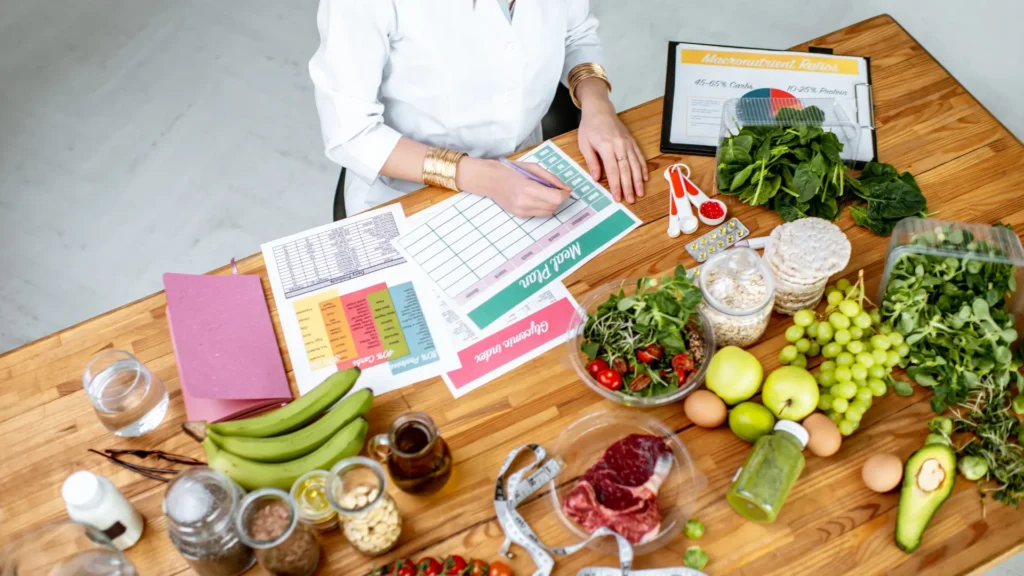Pregnancy is a truly magical time in an Indian family. It’s a journey filled with joy, anticipation, and a wealth of advice from well-meaning relatives, especially when it comes to food. The moment the good news is shared, the phrase “you must eat for two now” becomes a familiar, loving refrain. But what does this cherished advice really mean for the modern Indian woman?
It’s less about eating double the quantity and more about doubling the quality of your nutrition. Pregnancy is a unique window of opportunity where what you eat profoundly impacts not just your own well-being, but also lays the foundation for your baby’s entire life. As an obstetrician at Borneo Hospital in Thane, I’ve guided countless women through this beautiful phase, helping them understand the unique dietary needs during pregnancy. This guide is designed to offer clarity on the pregnancy nutrition helping you navigate your meals with confidence and joy, ensuring the best health for you and your little one.
Why is Nutrition So Crucial During Pregnancy?
Building the Foundation for a Healthy Future
Think of your pregnancy diet as the primary building material for your baby. Every nutrient you consume plays a vital role in their miraculous development. Essential vitamins and minerals are directly responsible for forming their organs, developing a healthy brain and spinal cord, building strong bones, and achieving a healthy birth weight. A well-nourished start is the greatest gift you can give your child before they are even born.
But the benefits are just as crucial for you, the mother. Your body is performing the incredible task of growing a new life, which demands immense energy and resources. Good nutrition helps support these changes, reduces the risk of pregnancy-related complications like gestational diabetes and high blood pressure, and crucially, helps prevent iron-deficiency anaemia, a very common concern for womens in India. A balanced diet also helps manage common discomforts like morning sickness and fatigue, and provides the strength you need for labour and postpartum recovery.

The Building Blocks: Macronutrients in Your Indian Diet
Getting the Right Balance of Carbs, Proteins, and Fats
A healthy pregnancy plate is all about balance. The three main macronutrients—carbohydrates, proteins, and fats—all have a special role to play.
1. Carbohydrates for Sustained Energy:
Carbohydrates are your body’s main source of fuel. Instead of simple carbs found in sugary drinks, biscuits, and white bread, focus on complex carbohydrates that release energy slowly and keep you feeling full for longer.
2. Excellent Indian Choices:
Whole wheat rotis, parathas (cooked with minimal oil), brown rice, dalia (broken wheat), oats, and traditional millets like jowar, bajra, and ragi are all fantastic options.
3. Proteins for Growth:
Protein is the ultimate building block, essential for creating your baby’s skin, hair, muscles, and organs. Your own body also needs more protein to support the growing uterus and placenta.
4. Vegetarian Indian Powerhouses:
India’s rich vegetarian cuisine offers an abundance of choices. Include a variety of dals (like toor, moong, masoor), legumes (chana, rajma), paneer, tofu, curd (yoghurt), sprouts, and nuts in your daily meals.
5. Non-Vegetarian Sources:
If you eat non-vegetarian food, well-cooked eggs and chicken are excellent sources of high-quality protein. Fish, especially low-mercury varieties, is also beneficial.
6. Fats for Brain Development:
Fats are not the enemy! Healthy fats are vital, particularly for the development of your baby’s brain and eyes. Omega-3 fatty acids, a type of healthy fat, are especially important.
7. Healthy Indian Fats:
Include pure ghee (in moderation), nuts (especially walnuts and almonds), seeds (flaxseeds, chia seeds), and avocados in your diet. Using traditional cooking oils like groundnut or mustard oil is also a good practice.
The Power-Packed Micronutrients: Vitamins & Minerals
The Micronutrients That Make a Macro Difference
Beyond the main building blocks, a host of vitamins and minerals are needed in small amounts but have a massive impact. These are the true nutrition essentials during pregnancy.
1. Folic Acid (Vitamin B9): The Protector:
- This is arguably the most critical micronutrient in early pregnancy. Folic acid plays a pivotal role in preventing major birth defects of the baby’s brain and spine (known as neural tube defects). It’s so important that it is recommended to start taking a folic acid supplement even before you conceive.
- Find it in your Indian Kitchen: Palak (spinach) and other leafy greens, lentils, chickpeas, bhindi (okra), and citrus fruits.
2. Iron: The Oxygen Carrier:
- During pregnancy, your blood volume increases by almost 50% to support your baby. Iron is needed to make more haemoglobin, the protein that carries oxygen in your blood. Iron deficiency is a leading cause of anaemia in pregnant Indian women, leading to fatigue and other complications.
- Boosting Iron in your Indian Diet: Load up on green leafy vegetables (spinach, methi), dates, jaggery (gur), beetroot, and pomegranate. Combining these with a source of Vitamin C (like squeezing lemon juice over your dal or salad) will significantly enhance iron’s absorption.
3. Calcium: The Bone Builder:
- You are building a whole new skeleton for your baby! Calcium is essential for their developing bones and teeth. If you don’t get enough calcium from your diet, your body will take it from your own bones, which can affect your health later in life.
- Calcium-Rich Indian Foods: Milk, curd, paneer, cheese, and ragi (finger millet) are excellent sources. Sesame seeds (til) and some leafy greens also contribute.
4. Vitamin D: The Sunshine Vitamin:
- This vitamin is crucial because it helps your body absorb calcium. Without enough Vitamin D, you can’t effectively use the calcium you eat.
- Sources for Indians: Apart from fortified milk and egg yolks, the best source is free! Safe, moderate exposure to early morning sunlight for 15-20 minutes can help your body produce Vitamin D.
5. Iodine: For Brain Development:
- Iodine is critical for the healthy development of your baby’s brain and nervous system.
- Easy Sources: Using iodised salt in your daily cooking is the easiest way to ensure an adequate intake. Yoghurt and eggs are also good sources.
6. Fibre and Fluids: The Comfort Crew:
- Constipation is an extremely common complaint during pregnancy. A diet rich in fibre and fluids can keep your digestive system moving smoothly.
- Stay Regular with: Whole grains, fruits, vegetables, and plenty of water. Other fluids like coconut water and fresh buttermilk (chaas) are also great for hydration.
A Sample Indian Meal Plan for a Day
This is not a rigid prescription, but an idea of how to structure your day to include all the nutrition essentials during pregnancy.
- Early Morning (on waking): A glass of plain milk or a small handful of soaked almonds and walnuts.
- Breakfast: A bowl of vegetable poha with peanuts, or two moong dal chillas (savoury crepes) served with a bowl of curd.
- Mid-Morning Snack: A seasonal fruit (an apple, banana, or orange) and a glass of fresh coconut water.
- Lunch: 2 whole wheat rotis, a bowl of dal, a serving of a seasonal sabzi (like beans or cauliflower), and a generous bowl of salad. A bowl of curd is a great addition.
- Evening Snack: A bowl of sprouts chaat (with chopped onions and tomatoes) or a handful of roasted makhana (fox nuts).
- Dinner: Keep it relatively light. Vegetable khichdi with a teaspoon of ghee, or 1-2 rotis with paneer curry.
- Bedtime: A glass of warm milk, perhaps with a pinch of turmeric.

Foods and Habits to Avoid or Limit
Navigating Your Diet Safely
Knowing what not to eat is just as important as knowing what to eat.
Foods to Strictly Avoid:
- Unpasteurised milk, and cheeses made from it (often labelled as ‘raw’ milk), as they can carry a harmful bacteria called listeria.
- Raw or undercooked meat, poultry, and eggs, due to the risk of salmonella.
- Fish known to be high in mercury, such as shark, swordfish, and king mackerel.
- Street food, especially from vendors where hygiene may be a concern. It’s better to be safe than sorry.
- While traditionally advised against, there isn’t strong scientific evidence, but it may be prudent to avoid raw papaya and pineapple.
Things to Limit:
- Caffeine: It’s best to limit your intake of tea and coffee to one or two small cups per day.
- Processed & Junk Food: These are high in salt, sugar, and unhealthy fats and offer very little nutritional value for you or your baby.
- Excessively Spicy and Oily Food: This can worsen common problems like heartburn and indigestion.
- Absolute No-Go’s: There is no safe amount of alcohol to consume during pregnancy. Smoking and tobacco use are also extremely harmful.
Managing Common Pregnancy Complaints with Diet
- Morning Sickness: Try eating small, frequent meals. Starting the day with something dry, like toast or a plain cracker, can help. Ginger, in the form of ginger tea or candy, often soothes nausea.
- Heartburn: Avoid very spicy, oily, or acidic foods. Eat smaller meals and try not to lie down for at least an hour after eating.
- Constipation: This can be managed very effectively with a high-fibre diet (whole grains, fruits, veggies) and by drinking plenty of water throughout the day.
A balanced and nutrient-rich diet is a powerful act of love and one of the most important commitments you can make for the health of your child and yourself. The nutrition essentials during pregnancy are not about perfection or stress, but about making conscious, healthy choices, one meal at a time. Enjoy the diverse flavours of Indian cuisine while knowing you are providing the very best for your little one.
Remember, this guide provides general advice. For a personalised diet plan that considers your specific health needs and preferences, it’s always best to consult your doctor.
For expert, compassionate maternity care and customised nutritional guidance, we invite you to book a consultation with Dr. Vrushali Pillai and our dedicated team. Visit your nearest Borneo Hospital branch in Thane, Nashik, Chhatrapati Sambhaji Nagar, or Raipur City. Your health and your baby’s well-being are our foremost priority.



